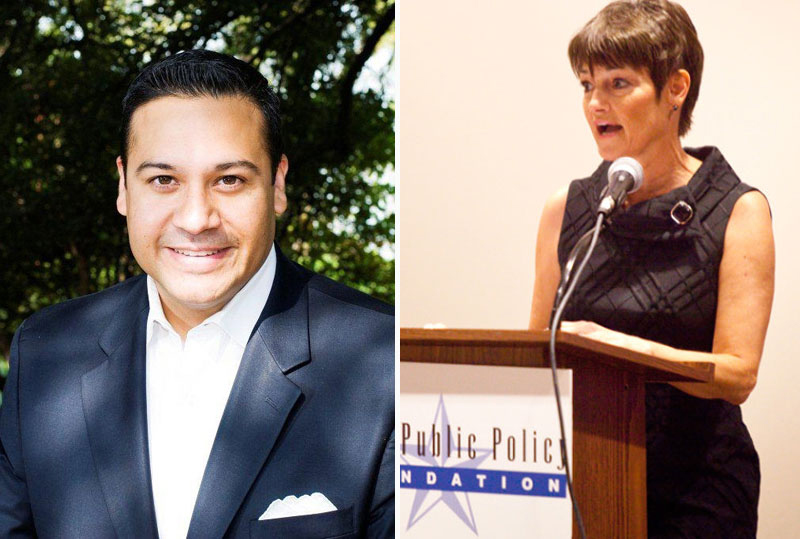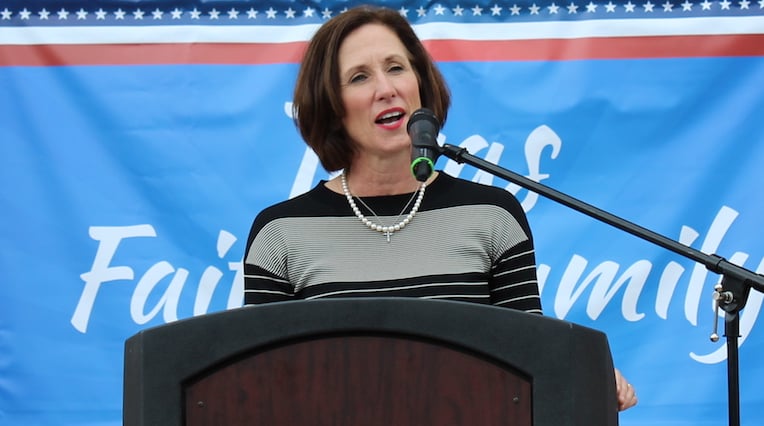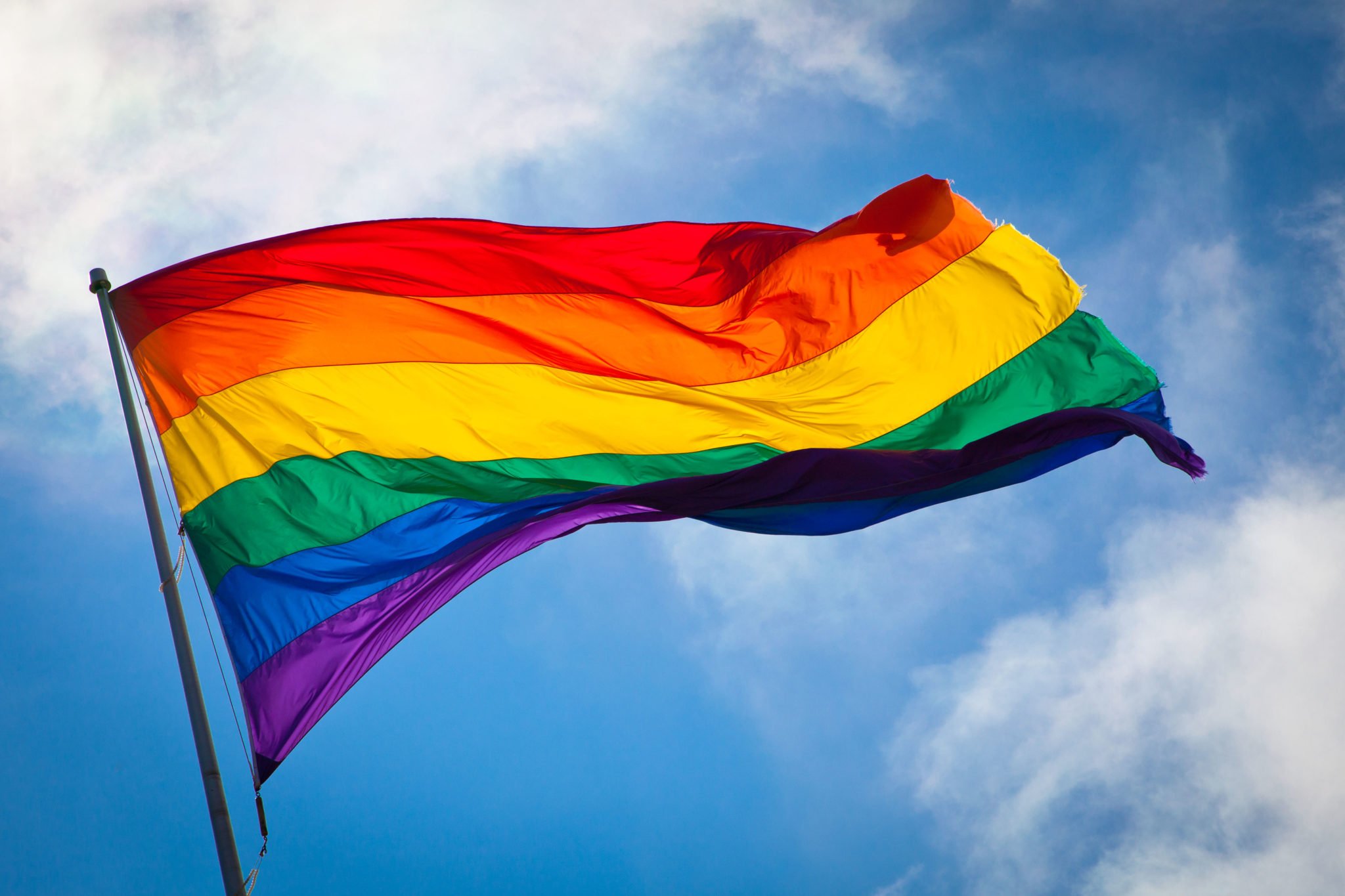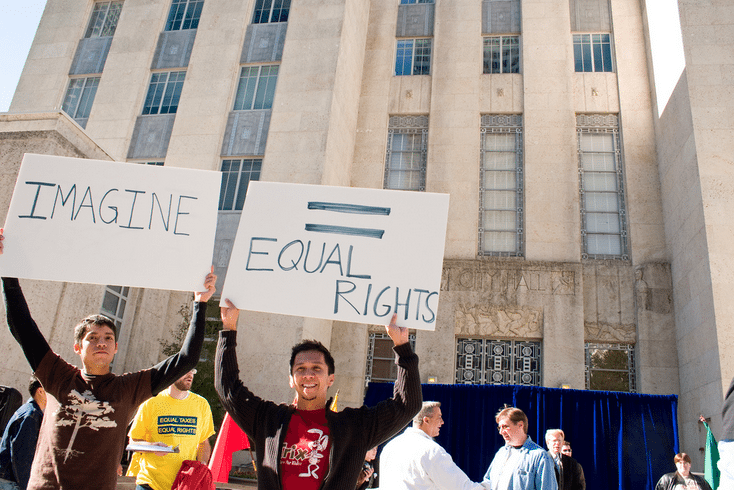
‘License to Discriminate’ Bills Pile Up in Texas Lege
The measures would limit the ability of cities to enforce laws protecting LGBT citizens.

Above: State Rep Jason Villalba (R-Dallas) (photo courtesy Jason Villalba) and state Rep Donna Campbell (R-New Braunfels) (photo by Patrick Michels)
Updated below with comments from Rep. Jason Villalba.
Two days after the Plano City Council approved an ordinance prohibiting discrimination against LGBT people, a Texas legislator filed a proposed constitutional amendment that would limit the ability of cities to enforce such laws.
On Wednesday, Rep. Jason Villalba (R-Dallas) filed House Joint Resolution 55, which is similar but not identical to Senate Joint Resolution 10, filed last month by Sen. Donna Campbell (R-New Braunfels).
Rep. Jeff Leach (R-Plano), one of several lawmakers who sent a letter to the Plano City Council opposing the nondiscrimination ordinance, also announced on Twitter Tuesday that he’s drafting a bill “to protect Texas business owners from unconstitutional infringements on their religious liberty.” As of Thursday morning, Leach’s bill hadn’t been filed, and he didn’t return a phone call seeking comment.
Nevertheless, a month before the session begins, the flurry of legislation suggests that, thanks in part to the legalization of same-sex marriage across much of the nation, conservatives will challenge gay rights in the name of religious freedom in the 84th Texas Legislature.
The resolutions from Campbell and Villalba would amend the Texas Constitution to state that government “may not burden” someone’s “sincerely held religious belief” unless there is a “compelling governmental interest” and it is the “least restrictive means of furthering that interest.” Villalba’s amendment would state that government “may not burden in any way a person ’s free exercise of religion” unless those same conditions are met.
Experts say the amendments could limit cities’ ability to enforce LGBT-inclusive nondiscrimination ordinances. In addition to Plano, cities that have passed LGBT-inclusive nondiscrimination ordinances include Austin, Dallas, Fort Worth, Houston and San Antonio.
That’s because business owners could claim exemptions from the ordinances if they have sincerely held religious beliefs—such as opposition to same-sex marriage—making it legal for them to fire employees for being gay or refuse service to LGBT customers.
“It blows a hole in your nondiscrimination protections if people can ignore them for religious reasons,” said Jenny Pizer, senior counsel at the LGBT civil rights group Lambda Legal.
But Pizer and others said an even bigger problem could be the amendments’ unintended consequences.
“Businesses that want to relocate to Texas will think that their LGBT employees and the family members of their LGBT employees are not going to be welcome.”
“A church or a synagogue or a mosque could conceivably be built anywhere with no concern to traffic flow or how much parking is available or building codes,” Williams said. “There are butchers that butcher in accordance with very specific religious laws, and they’re able to do that, but the city and the state enforce environmental protections that ensure we don’t wind up with giant ponds of blood in residential neighborhoods. If you take away the ability of cities to enforce those, it’s going to have an enormous negative impact on the quality of life for everyone in that area.”
Villalba didn’t return a phone call seeking comment, but he told WOAI, “I raise my little ones to have a deep and abiding respect for the Almighty, and I will fight to ensure that their religious liberty is not limited merely because they step foot into their public school or town square.”
Campbell, meanwhile, has insisted the intent of SJR 10 isn’t discriminatory, even though she was a vocal opponent of San Antonio’s nondiscrimination ordinance passed last year.
“That some have purposefully misrepresented this bill as changing Texas law to allow discrimination is greatly disappointing and wholly inaccurate,” Campbell wrote on Facebook in response to a deluge of criticism over SJR 10. “Freedom of conscience is one of our most sacred rights going back to the founding of our nation. The intent of this resolution is to protect and promote diversity of thought and expression where others have sadly tried to hinder it.”
Asked whether SJR 10 would give businesses a “license to discriminate,” Campbell spokesman Jon Oliver told the Observer this week that the label reflects a rebranding effort “by some on the left who are hostile to religion.”
Oliver also alluded to the fact that Texas law doesn’t currently include protections against discrimination based on sexual orientation or gender identity.
“I don’t know how it will affect local ordinances,” Oliver said. “I can tell you it won’t affect state law regarding protected classes for hiring or firing individuals. Our bill does not deal with protected classes and does not attempt to change state law in that respect.”
Oliver said it’s important to have a constitutional amendment protecting religious freedom because the statute could easily be changed by future Legislatures. He also tied SJR 10 to Houston’s recent decision to subpoena pastors’ sermons as part of the city’s defense against a lawsuit aimed at repealing its Equal Rights Ordinance.
“The goal is to keep pastors sermons from being subpoenaed,” Oliver said.
Williams noted that similar resolutions from Campbell have failed in previous sessions. Amending the state Constitution requires two-thirds support in both chambers as well as a majority public vote.
“That’s a very high bar, and the Legislature’s a deliberative body,” Williams said.
“I raise my little ones to have a deep and abiding respect for the Almighty, and I will fight to ensure that their religious liberty is not limited merely because they step foot into their public school or town square.”
“This would have a detrimental affect on businesses that are looking to relocate to Texas,” he said. “Businesses that want to relocate to Texas will think that their LGBT employees and the family members of their LGBT employees are not going to be welcome.”
It’s the same strategy that’s been used to defeat similar legislation in other states, including Arizona, where Gov. Jan Brewer vetoed a so-called “license to discriminate” bill earlier this year in the the face of strong opposition from Fortune 500 companies.
According to campaign finance reports, Sen. Campbell has received significant contributions from several corporations with perfect scores on the Human Rights Campaign’s Corporate Equality Index, which measures employers’ support for the LGBT community.
But none of those otherwise gay-friendly corporations would go on record this week in opposition to SJR 10.
“SJR 10 is one of thousands of bills filed, we will weigh in and comment on bills when and if they are scheduled for hearing,” said Mona Taylor, a spokeswoman for Dallas-based AT&T Inc., which contributed $5,000 to Campbell’s campaign through its PAC this year.
Other companies with perfect HRC scores that have contributed to Campbell’s campaign in the last year include General Motors Co. ($2,500), Citigroup Inc. ($1,500), UnitedHealth Group Inc. ($,1000), the Raytheon Co. ($1,000), Merck & Co. ($1,000), Genentech Inc. ($750) and Astellas Pharma Inc. ($500).
Update: Villalba told the Observer on Thursday that HJR 55 has been misrepresented and is not intended to undermine local nondiscrimination ordinances. He said he opposes any kind of discrimination, including based on sexual orientation.
Villalba said HJR 55 would merely incorporate language from the free exercise clause of the U.S. Constitution into the Texas Constitution, and was drafted in response to incidents like a recent one in Cherokee County, where officials came under fire for displaying a nativity scene at the courthouse.
“That’s what this is meant to address, not these anti-discrimination regulations that you’re seeing pop up around the state,” Villalba said. “To me, those kinds of regulatory provisions are local in nature.”
Villalba declined to say whether he supports the right of businesses to turn away same-sex couples. He also would not commit to supporting legislation banning anti-LGBT discrimination statewide.
“I don’t make it a habit to opine on legislation that’s not currently before me,” he said. “I believe we should not discriminate against people because of their sexual orientation, and it’s important that we accept and treat all Texans with the dignity and respect they deserve as human beings.”
Updated (Dec. 21): The original version of this story stated that HJR 55 would prohibit government from burdening someone’s “sincerely held religious belief.” HJR 55 would instead prohibit government from burdening “in any way a person ’s free exercise of religion.” The story has been corrected. We regret the error.


